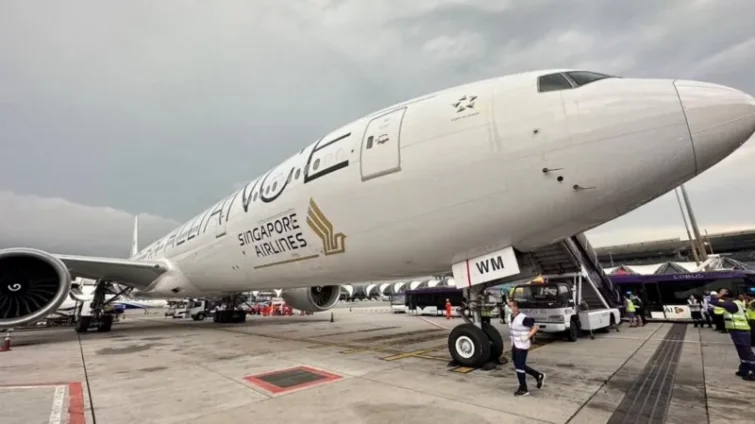One person has died and several others injured on a Singapore Airlines flight from London that was hit by severe turbulence.
The Singapore-bound Boeing 777-300ER was diverted to Bangkok and landed at 15:45 local (08:45 GMT).
Flight tracking data suggests the airliner dropped 6,000 feet (2,000m) in a matter of minutes after crossing the Bay of Bengal.
Flight SQ 321 was carrying a total of 211 passengers and 18 crew, the airline said in a statement.
"Singapore Airlines offers its deepest condolences to the family of the deceased," it said.
The airline added that it was working with Thai authorities to provide medical assistance to passengers, and was sending a team to Bangkok to provide any additional help needed.
Thai authorities have despatched ambulances and emergency teams to Suvarnabhumi Airport.
Singapore's Transport Minister Chee Hong Tat said the government would provide assistance to the passengers and their families.
"I am deeply saddened to learn about the incident onboard Singapore Airlines flight SQ321 from London Heathrow to Singapore," he posted in a statement on Facebook.
What happened on board the flight is still unclear.
One passenger told Reuters news agency that the aircraft suddenly started "tilting up and there was shaking".
"So I started bracing for what was happening, and very suddenly there was a very dramatic drop so everyone seated and not wearing seatbelt was launched immediately into the ceiling," 28-year-old student Dzafran Azmir said.
"Some people hit their heads on the baggage cabins overhead and dented it, they hit the places where lights and masks are and broke straight through it."
Turbulence is most commonly caused by aircraft flying through cloud but there is also "clear air" turbulence which is not visible on a jet's weather radar nor is it possible to predict.
“Injuries from severe turbulence are relatively rare in the context of millions of flights operated.
"However, severe turbulence can be dramatic and lead to severe injuries or sadly in this case a fatality," aviation expert John Strickland told the BBC.
Flight crews are also trained in how to respond to turbulence, he added.
"It is not for nothing that airlines recommend keeping seat belts loosely fastened throughout a flight be it long or short," he added.
Research has shown that climate change will make severe turbulence more likely in the future.
Latest Stories
-
Former NPP Deputy National Youth Organiser eyes Women Organiser role
6 minutes -
Gyakie returns with ‘Sankofa,’ a stirring prelude to debut album After Midnight
11 minutes -
Breaking barriers and building networks: AT’s Chief Business Officer on gender equality in digital transformation
18 minutes -
ISRQ2025: Prospects International edges out Golden Angels School to reach semifinals
22 minutes -
ECG rolls out real-time data system to boost power reliability in Ashanti Region
23 minutes -
NDC displaying political witch-hunting, not enforcing the law – Ahiagbah on Adenta Kumi’s arrest
25 minutes -
Useless Column: Oga landlord
28 minutes -
Use AI responsibly to tackle journalism challenges – GJA Chairperson advises
36 minutes -
GRIDCo schedules May 25 power outage in parts of Weija and Kasoa for critical maintenance
43 minutes -
Sonnie Badu, Herty Corgie, others minister at Rev. Agormeda’s 50th birthday celebration
48 minutes -
Evacuate now or risk disaster – GWL warns as Weija Dam spillage begins
54 minutes -
ISRQ2025: Alpha Beta secures last semifinal slot after beating Lighthouse Christian Mission School
59 minutes -
Adom Kiki releases ‘Dynamis the Mix’, a reggae gospel medley
60 minutes -
NPP’s Adenta Kumi formally charged with publication of false news – Lawyer
1 hour -
Full ruling of Supreme Court’s dismissal of Vincent Assafuah’s injunction application against CJ’s removal process
1 hour

